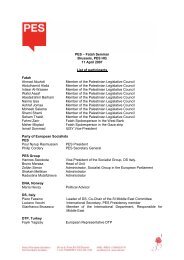Hedge funds and Private Equity - PES
Hedge funds and Private Equity - PES
Hedge funds and Private Equity - PES
Create successful ePaper yourself
Turn your PDF publications into a flip-book with our unique Google optimized e-Paper software.
90<br />
As far as the hedge fund <strong>and</strong> <strong>Private</strong> <strong>Equity</strong> industry is concerned, however, Art. 47 para 2 EC<br />
is a more obvious regulatory norm but its application must be considered on a case by case<br />
basis. Regulations in this area have the aim of coordinating legal <strong>and</strong> administrative provisions on<br />
the commencement of independent activities. A regulation could therefore apply in the case of<br />
investment companies themselves. Fundamental money market legal provisions are already<br />
founded on Art. 47 of the European Treaty: for example, the Markets in financial instruments<br />
directive (MiFiD). Particularly the Directive on the coordination of laws, regulations <strong>and</strong> administrative<br />
provisions relating to undertakings for collective investment in transferable securities<br />
(UCITS) is based on this regulation.<br />
MIFID introduces more detailed requirements covering: the organisation <strong>and</strong> conduct of<br />
business of investment firms, <strong>and</strong> how regulated markets <strong>and</strong> MTFs (Market trading facilities)<br />
operate; new pre-<strong>and</strong> post-trade transparency requirements for equity markets; the<br />
creation of a new regime for ‘systematic internalisers’ of retail order flow in liquid equities;<br />
<strong>and</strong> more extensive transaction reporting requirements.<br />
Types of firms to be regulated by the MiFID requirements are: investment banks; portfolio<br />
managers; stockbrokers <strong>and</strong> broker dealers; corporate finance firms; many futures<br />
<strong>and</strong> options firms; some commodities firms.<br />
Most firms that fall within the scope of MiFID will also have to comply with the new<br />
Capital Requirements Directive (CRD), which is similar to Basel II, which will set requirements<br />
for the regulatory capital which a firm must hold.<br />
MiFID will require transaction reports for any instrument admitted to trading on a regulated<br />
market including commodity instruments e.g electricity, oil <strong>and</strong> metals admitted to<br />
trading on exchange.<br />
***<br />
Looking to the challenges of offshore activities, there is much work to do. In accordance with<br />
Article 56 of the European Treaty – free movement of capital <strong>and</strong> payments, there is in principle<br />
a comprehensive prohibition on restrictions also in relation to third countries, which may be<br />
limited only under the conditions laid down in the exceptional provisions of Art. 57-59.<br />
Article 59<br />
Where, in exceptional circumstances, movements of capital to or from third countries<br />
cause, or threaten to cause, serious difficulties for the operation of economic <strong>and</strong> monetary<br />
union, the Council, acting by a qualified majority on a proposal from the Commission<br />
<strong>and</strong> after consulting the ECB, may take safeguard measures with regard to third countries<br />
for a period not exceeding six months if such measures are strictly necessary.<br />
For the regulation of offshore investors or their on-shore resident business partners the basis of<br />
authorisation of Art. 57 para 2 EC can be taken into consideration. According to that, only the<br />
EU, more precisely the Council at the proposal of the Commission, can enact new restrictions<br />
(which hasn’t happened since 1993) on capital movements with third countries, in connection<br />
with direct investments, including real property, with the registered office, the furnishing of finan-




